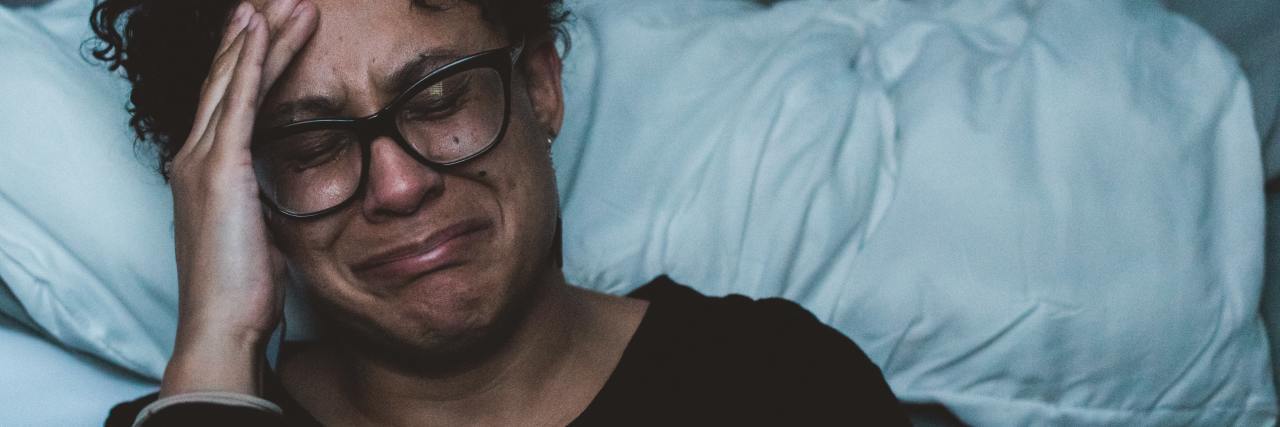Sexual Assault Awareness Month Is Important, but Hard for Rape Survivors
Editor's Note
If you’ve experienced domestic violence or emotional abuse, sexual abuse or assault, the following post could be potentially triggering.
You can contact The National Sexual Assault Telephone Hotline at 1-800-656-4673.
You can contact The National Domestic Violence Hotline online by selecting “chat now” or calling 1-800-799-7233.
You can also contact the Crisis Text Line by texting “START” to 741741.
In sixth grade at my exclusive private religious school, I was raped by my physical education teacher. I will never forget that day as long as I live. He coerced me into coming to his basement office to help him after school. I knew I did not like him, but he pressured me and made me feel bad for helping the other teachers and not him. I went against my gut instinct and I complied.
My cousin who was three years younger than me also attended the school. She liked and respected my rapist as she played sports and she worked closely with him.
To buy my silence, my rapist told me if I told about what he did to me, he would rape my cousin. I would never want that to happen and did not want to be responsible for something so horrific happening to her. I stayed quiet.
I went to school every day and had to attend his class. I quit his track team and withdrew from life as I knew it. I was already being abused at home so there was nowhere for me to turn. I just accepted that this was my life and there was no way out for me. I had a sign on my back, and it said I was open to anyone taking advantage of me, so I thought.
It was not until college that I found my voice, and joined and ran a campus club called Coalition Against Rape (CARE). I did speaking engagements on campus to other clubs, fraternities and sororities about rape and sexual assault and told my personal story. I led candlelight vigils and Take Back the Night marches down fraternity row and all throughout the campus. I spoke to the board of trustees about the risk of rape on campus. I started a safety whistle program (distributing 5,000 whistles) on campus — a program that was later adopted by the police department. I became a volunteer for the local Rape Crisis Center and worked the hotline and was a hospital crisis counselor.
I had found my voice.
Mixed Emotions
When Sexual Assault Awareness Month (SAAM) comes along, I think about all my advocacy work and how empowering and life-giving it was. I really feel that I made a difference and helped others avoid living with their sexual assault on their own, as I did.
But SAAM also brings up all my trauma. I was just 11 years old when I was raped. How my mind processed all of that is so complicated.
Every October, on the anniversary of my sexual assault, I think about what happened to me in graphic detail.
I know it is important to annually, and more often, bring attention to this issue, but it can be hard on us survivors. SAAM brings back all the ugly memories of how no one helped me. No one saved me.
As you raise awareness this month and as you advocate for sexual assault victims, remember:
- To be gentle. Not everyone is going to want to talk or process with you.
- Believe them.
- Some others are going to want to talk a lot about their experiences, so be a good listener.
- This is not about you and how you feel about sexual assault. This is their story.
- No one got into this situation by any fault of their own. You should not be victim-blaming.
- We can all be allies in stopping sexual assault and helping victims. A good ally listens first.
- Educate yourself about root causes, sources and impact on individuals and communities.
- Understand what rape culture is and work to end it.
- Talk in untraditional circles about sexual assault and how everyone can work to end it.
- Be a voice for the voiceless and help amplify their voices.
- Financially support causes that support survivors.
- Advocate for legislation and policies that support survivors.
- Make sure your local police departments have policies that protect survivors.
To all my fellow survivors, know that I see you and care about you. You are of great value and deserve to be cared for. You are not alone, and change is coming, albeit slow. More people are paying attention and more of us are coming forward (if we can). SAAM is a good start in drawing attention to these issues. We are at the beginning of the movement. Hang in there.
We are Mighty Strong!
Here are some resources for survivors seeking support as well as those who want to help:
- The Rape, Abuse and Incest National Network (RAINN).
- Rape crisis center locator: You can use this tool to find a center near you — for services or to reach out to offer donations or get involved.
- National Sexual Violence Resource Center (NSVRC): NSVRC leads Sexual Assault Awareness Month and offers more information about how you can get involved.
- Substance Abuse and Mental Health Services Administration: An agency of the U.S. Department of Health and Human Services that works to improve behavioral health. The site offers resources such as a treatment locator.
- National Alliance on Mental Illness (NAMI): For sexual assault survivors living with addiction, post-traumatic stress disorder (PTSD) or other challenges, NAMI can be a starting point in searching for local chapters that can connect survivors with resources and mental health professionals.
Culturally competent therapist directories and resources:
Photo by Claudia Wolff on Unsplash

